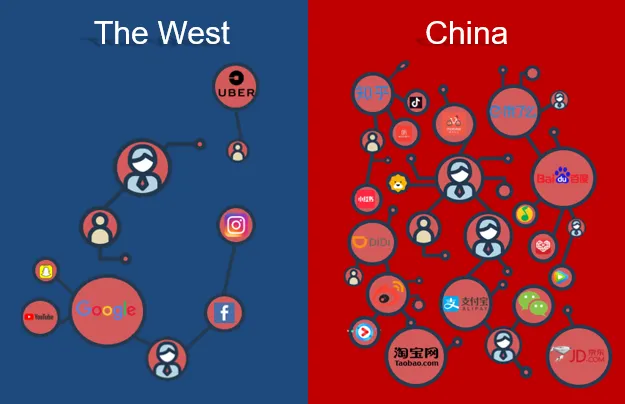
On the one hand, people believe that democratic governments are superior to totalitarianism. On the other hand, many believe that China's autocratic government allows it to centrally plan the economy and thus become more powerful than the West. Therefore, it is held by some that the West must unite to suppress the success of China.
Is Western society economically inferior to China because it is morally superior?
No. A free society is morally superior to a totalitarian one because freedom leads to human flourishing. The reason we need morality on a personal level is to thrive as an individual, and the reason we want to live in a moral society that protects property rights is to allow everyone to thrive without conflict with each other. Only individuals produce, and when every individual is free to be productive to the best of his ability, so the potential of an entire society is utilized to its fullest.
The altruist ideology, on the other hand, demands the sacrifice of individual values to the collective. Just like the Soviet Communists, the Chinese Communist Party demands the sacrifice of individual values to the values of the State. In practice, this means that the party maintains a monopoly on much of the economy, and steals the businesses (by degrees or entirely) of anyone who becomes too successful. China's economy is growing despite the Communist Party, not because of it.
If not totalitarianism, what's responsible for China's rise? China's economic growth only began once free-market reforms were adopted by Deng Xiaoping in 1979 with his idea of 小康社会, or "moderately prosperous society." Deng was inspired by Lee Kuan Yew (the founder of modern Singapore) to adopt an autocratic mixed economy instead of a socialist state. However, China's free-market reforms stalled out and regressed when the Communist Party leadership realized that further liberalization would threaten its power.
According to the World Economic Forum, the private sector "contributes 60% of China’s GDP, and are responsible for 70% of innovation, 80% of urban employment and provide 90% of new jobs." This is the real driver of China's progress. This is about the same numbers as France.
Although the economy is more regulated in China than in Western countries, the informal economy is far larger, and it's debatable whether there is more economic freedom in China or some European welfare states. China's rapid growth is explained mostly by the fact that it started from nothing quite recently. As it reaches parity with the west, its advantages in cheap labor will vanish and its public sector will drag it down as well, nullifying its advantage in growth rate.
What Westerner governments really resent is that China has proven that Western-style democracy has little to do with prosperity -- or human happiness. What matters is economic freedom, and as China's ongoing crackdown is proving, too much economic freedom is destabilizing to the ruling regime.
So will China become the world's military and economic superpower? Maybe - China has two things going for it:
First, is its optimism. Fifty years of rapid economic growth has instilled a sense of progress and national destiny. This optimism manifests in a higher savings rate, which means less consumer spending in exchange for faster economic growth.
The West, on the other hand, has been stagnating under generations of welfare statism and tribalism. Westerners fight over a shrinking pie, while the Chinese focus on growing theirs - that's why China's savings rate is 44.9% vs America's 7.9%.
The second advantage China has is that it's not a democracy. Democracy is a slow-burn civil war, as politicians rise to power by promising to redistribute wealth and provide political favors. In each country, state, and city, each administration works to loot as much as it can get away with before it's voted out of office. This makes long-term planning or infrastructure maintenance impossible. Additionally, environmentalism and NIBMY'ism have ensured that grand infrastructure projects have all but vanished in the developed world.
China has dozens of grand public works projects, but on the other hand, the culture of expropriation and state enterprises limits the scale of private enterprises, so technological leadership is stifled.
The competition is therefore between interventionist economies, and the winner will be the one that sustains a greater degree of freedom over the long term.